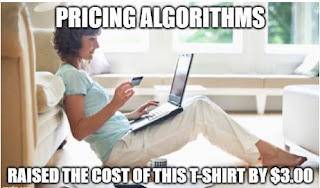Pricing Algorithms Seem to Be Making the Online Shopping a Experience Worse.
Have you ever gone to a store like Target or Walmart in person, find an item you want then discover that when you go to have it rung up the price is more? You would find the cashier or manager or someone to get it resolved.
Well, thanks to our capitalistic nature, online shopping gives us a similar experience:
If you've shopped online recently, you may have had this experience: You find an item, add it to your cart, and then when you get around to paying, the price has increased.
You can thank pricing algorithms.
These are computer programs that look at factors such as supply, demand and the prices competitors are charging, and then adjust the price in real time. Now, there are calls for greater regulation at a time when these tactics are expected to become more common.
"A key thing about the algorithm is that given different inputs, like, say, time of day or weather or how many customers might be showing up, it might decide on a different price," said Harvard economics professor Alexander MacKay.
This seems like a sure-fire way to tick a lot of online shoppers off. And, like similar ideas, the expectations were apparently different than the reality:
Theoretically, these algorithms could be good for competition. For example, if one business sets a price, the algorithm could automatically undercut it, resulting in a lower price for the consumer.
But it doesn't quite work that way, MacKay said. In a paper he co-authored in the National Bureau of Economic Research, he studied the way algorithms compete. He found that when multiple businesses used pricing algorithms, both knew that decreasing their price would cause their rival to decrease their price, which could set off a never-ending chain of price decreases.
So instead of giving one company a real-time leg-up on a competitor, the company can squeeze a bit more from presumably (if not formerly) loyal customers. Not that this is a preferable alternative for the companies.
"Why try to start a price war against a firm whose algorithm will see my price change and immediately undercut it," he said.
The impact of algorithms can be more than just a few extra dollars at checkout. During the 2017 terrorist attack on the London Bridge, Uber's pricing algorithm sensed the increased demand and the price of a ride surged in the area. Uber later manually halted surge pricing and refunded users.
The price fluctuations as a result of algorithms have also been found to increase feelings of customer betrayal.
No kidding. In in true American fashion, capitalism creates a problem that now government has to deal with:
MacKay said a few regulations could help avoid some of these consequences and bring competition to a more standard model. The first would be preventing algorithms from factoring in the price of competitors, which he said was the key factor weakening price competition. The second was decreasing how frequently businesses could update their prices, which he said would mitigate or prevent a business from undercutting a competitor's price.
Yet ultimately, MacKay said pricing algorithms were only going to get more common.
"Firms are trying to maximize profits and they're trying to do it in a way that's legal and competitive," he said. "It's sort of in your best interest to adopt an algorithm to be able to consistently undercut your rivals to maintain a market share advantage."
My advice is to keep an eye on that "grand total" screen but you commit to pay. Also, advocate for more corporate regulation to protect to consumer.

Comments